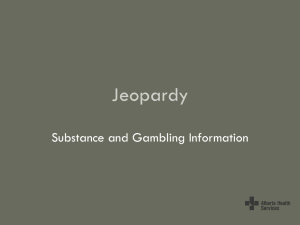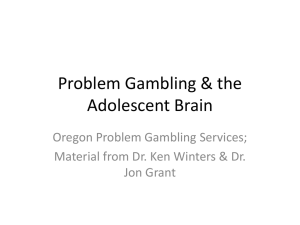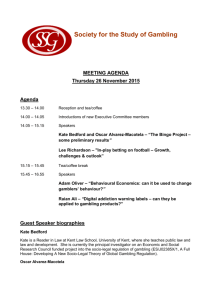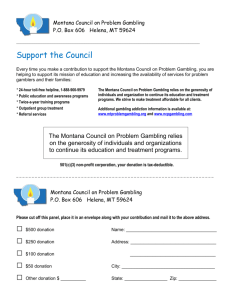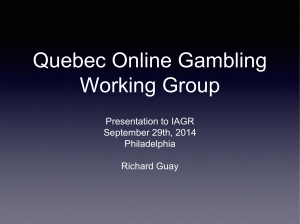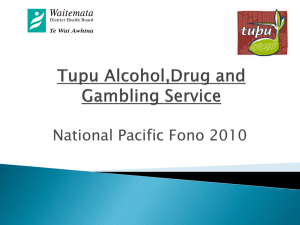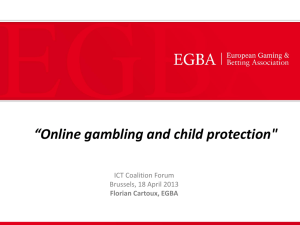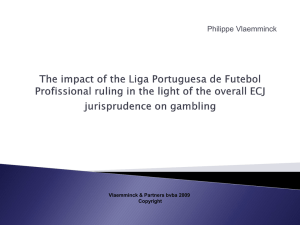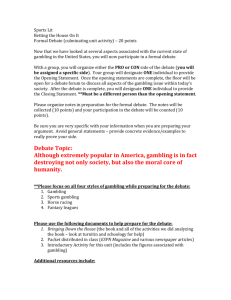RGSB Strategy Consultation submission – September 2015
advertisement
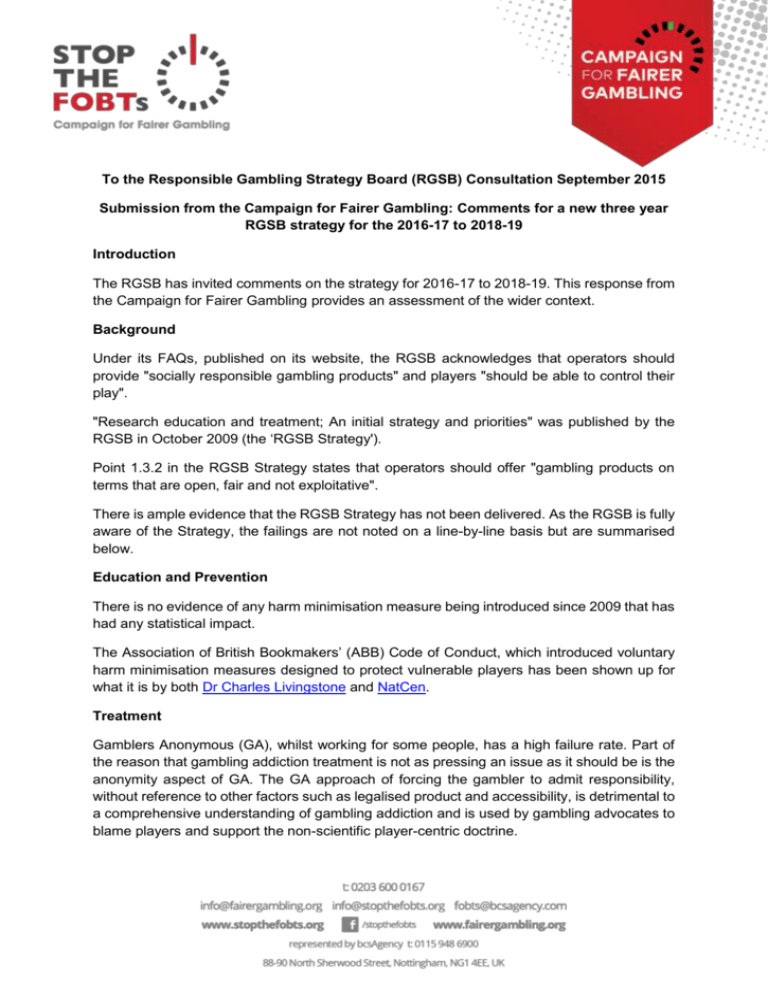
To the Responsible Gambling Strategy Board (RGSB) Consultation September 2015 Submission from the Campaign for Fairer Gambling: Comments for a new three year RGSB strategy for the 2016-17 to 2018-19 Introduction The RGSB has invited comments on the strategy for 2016-17 to 2018-19. This response from the Campaign for Fairer Gambling provides an assessment of the wider context. Background Under its FAQs, published on its website, the RGSB acknowledges that operators should provide "socially responsible gambling products" and players "should be able to control their play". "Research education and treatment; An initial strategy and priorities" was published by the RGSB in October 2009 (the ‘RGSB Strategy'). Point 1.3.2 in the RGSB Strategy states that operators should offer "gambling products on terms that are open, fair and not exploitative". There is ample evidence that the RGSB Strategy has not been delivered. As the RGSB is fully aware of the Strategy, the failings are not noted on a line-by-line basis but are summarised below. Education and Prevention There is no evidence of any harm minimisation measure being introduced since 2009 that has had any statistical impact. The Association of British Bookmakers’ (ABB) Code of Conduct, which introduced voluntary harm minimisation measures designed to protect vulnerable players has been shown up for what it is by both Dr Charles Livingstone and NatCen. Treatment Gamblers Anonymous (GA), whilst working for some people, has a high failure rate. Part of the reason that gambling addiction treatment is not as pressing an issue as it should be is the anonymity aspect of GA. The GA approach of forcing the gambler to admit responsibility, without reference to other factors such as legalised product and accessibility, is detrimental to a comprehensive understanding of gambling addiction and is used by gambling advocates to blame players and support the non-scientific player-centric doctrine. Gambling - The Hidden Addiction explains the pitifully inadequate funding of treatment and lack of adequate NHS involvement. GamCare is compromised by the non-tendered-for funding process. GamCare’s published statistics are inaccurate, as they incorrectly separate roulette machines in betting shops and fruit machines in betting shops as if these are separate products. GamCare staff are poorly paid and are now only offering twelve sessions of counselling. The relapse rate of those who have been through treatment is high, particularly in respect of fixed odds betting terminal (FOBT) gamblers. GamCare executives have ceased commenting on gambling products. Research The RGSB has not yet provided any meaningful comments on the British Gambling Prevalence Survey (BGPS) secondary analysis in 2007 and 2010. These papers were based on publically funded data-collation and highlight that FOBTs are the most addictive gambling product and generate more losses from vulnerable persons than the several other leading bricks-and-mortar gambling activities combined. The RGSB has ignored Campaign for Fairer Gambling commissioned 2CV studies. The survey methodology utilised by 2CV is the same as that used by the British Gambling Prevalence Survey. The key difference being the 2CV sample consisted of only betting shop customers. The Responsible Gambling Trust (RGT) is not highly regarded in the wider academic community as evidenced in Fair Game. The RGSB has endorsed the RGT’s 2014 FOBT research, despite the fact that the RGT made misrepresentations regarding what it might deliver, that there was no public tendering in commissioning the research and that an entity with an active commercial interest in maintaining the £100 maximum stake, Featurespace, was commissioned to carry out a significant proportion of the research. The RGT’s FOBT research was engineered when the RGT was controlled by the bookmakers through Neil Goulden. At the same time Mr Goulden was then also Chair of the ABB and selected the RGT employee Marc Etches and researcher Jonathon Parke as Director of Commissioning. The current RGT structure of trustees and public tendering is not reflective of the circumstances in 2012. The RGT current tendering was not willing to contemplate research related to gambling reduction as a way to reduce gambling harm. This is demonstrative of the RGT’s refusal to accept that harm minimisation and revenue minimisation must go hand-in-hand. The RGSB has ignored the fact that the RGT had stated it has no position on FOBT stakes and that none of the report summaries contained a position on FOBT stakes. However, at the 2014 public RGT event, David Excell of Featurespace spoke against a FOBT stake reduction, as did the "independent" trustee Jonathon Wolff. The RGSB has ignored the evaluation of the RGT research, as compiled by Professor Linda Hancock and Shannnon Harahan to an internationally acceptable academic standard. However, the same cannot be said of the RGT’s research programme, the findings of which were carefully managed to ensure a pre-determined narrative prevailed, despite certain findings conflicting with this narrative. The RGSB cannot provide any assurance that the RGT research was conducted to the same standards as the evaluation carried out by Professor Linda Hancock and Shannon Hanrahan. The RGSB has had private meetings with RGT researchers to form the basis of advice to the Gambling Commission, which also had meetings with researchers, including the commercially biased David Excell. The Commission provided advice to DCMS, which included the RGSB advice. Under the Sustainable Communities Act, once the Newham FOBT stake proposal is resubmitted by the Local Government Association (LGA), the government, including DCMS, must act in good faith to accommodate the proposal or negotiate on the proposal with the LGA’s selector panel. The selector panel must be provided with access to all information that DCMS uses to support its position. As DCMS will rely on Commission and RGSB advice and, as that was based on input from the RGT researchers, then there must be full disclosure of advice from researchers to the Commission and the RGT. Even if there is an excuse of denying this, based on Freedom of Information request (FOI) exemptions, these exemptions should be waived. Gambling policy should be transparent when it is not related to an issue of national security. The RGSB has ignored Australian research by The Australian National University and Southern Cross University and a study by Gary Banks, Chairman of Australia’s Productivity Commission, which shows that aggregate spend is a predictor of gambling related harm, and that stake reduction reduces gambling related harm. The RGT was formed from the merger of the Responsible Gambling Fund (RGF) and Gambling Research Education and Treatment Foundation (GREaT), at the time when the RGF had commissioned NatCen to undertake in-situ live machine play analysis, which the bookmakers refused to participate in. Despite DCMS wanting research on a live FOBT, a substitute methodology was conducted for the RGT by Adrian Parke, brother of Jonathan Parke. The conclusions were watered down by the recommendation that in-situ research would have been better, exactly the research that the bookmakers refused to participate in and which the RGSB and the RGT could have insisted on in 2012. The Campaign has written a letter to David Excell requesting an evidence based explanation of any FOBT measure that would provide a greater harm reduction that stake reduction. To date, Mr. Excell has not responded. A similar letter was sent to the Cabinet Secretary Sir Jeremy Heywood, who foolishly endorsed Featurespace on Twitter. Sir Jeremy also appears to be unable to respond at this time. The Campaign recommends that if there is no single evidence based harm reduction measure that is superior to stake reduction, then the RGSB should endorse stake reduction. Harm Regarding all gamblers as having the same vulnerability to harm is a fallacy. Similarly the socio-economic harm varies by product and by demographic. The well-off grandmother becoming addicted to online bingo is sad but has limited wider consequences. A young unemployed male from a deprived area, with a peer group engaged in criminal activities, becoming addicted to FOBT cash gambling is a socio-economic disaster. The cost to social services, health services and judicial services will far exceed the taxes generated by the gambling activity. The harm to family and relationships is immeasurable. Research into the harm costs, individually and socially by demographic and by product should be a priority for the RGSB. Philosophy There are a number of respects in which the "responsible" terminology is used that suggest either ignorance or a self-serving or wilful attempt to support an industry propagated narrative. The Commission motto "keeping gambling fair and safe for all" is a false descriptor. The RGSB should advise the Commission to cease using it. The concept that most people gamble responsibly is very misleading in a few respects. Firstly, prevalence surveys are based on recent participation, with questions limited to determining the sample’s engagement within the last year. There has never been a lifetime longitudinal study. Such a study that includes the impact of new technologies in gambling products would take the next 60 years. As people drift in and out of problem gambling, the notional rounded 1% in a year must be far greater over a lifetime. So over 60 years, if problem gamblers are in that state for an average of four years, then the actual lifetime rate would be 15%. Secondly, the current methodologies relate to problem gamblers as a percentage of the population as a whole, or as a percentage of gamblers, rather than as a percentage of engaged gamblers. They do not include an assessment of the proportion of problem or at-risk gamblers associated with respective products, specifically those that are engaged primarily with a particular product. Thirdly, loyalty cards have been used efficiently as a marketing tool by US casinos for many years. Conventional wisdom from this data is that 80% of the revenue is from 20% of the players. Therefore, conversely, 20% of the revenue is from 80% of the players. That shows that engaged gamblers are involved around 16 times more in gambling than non-engaged gamblers. The BGPS secondary 2010 survey estimates that 40% of time and spend on FOBTs is accounted for by vulnerable gamblers (problem or at-risk). It would not be unreasonable to presume that, on this basis, 50% of engaged FOBT gamblers are vulnerable persons. RGT research showed that at a £13.40 FOBT staking level or higher, 80% of loyalty card gamblers exhibited problem gambling behaviour. RGSB should request that the RGT disclose the staking level at which 51% of FOBT users experience harm, and 100% of FOBT users experience harm. This would enable the RGT research to inform government policy, when at present the programme of research has evidently been a waste of both time and resources to that particular end. Responsibility In addition to the RGSB and the RGT, other parties want to adopt responsibility as part of their PR pitch. This weakens the concept of responsibility as a deliverable principle. The Group for Responsible Gambling represents several trade sectors. Whilst the group can take a position on a subject that is primarily of relevance to one sector, such as TV advertising, and represent that position as a Group position, it is doubtful if the Group will ever be able to take a uniform position on a subject that applies to all sectors. The Senet Group, promoting responsible gambling standards, is a blatant attempt by bookmaking corporations to influence the media and politicians. The new ABB Responsible Gambling Code 2015 refers to a Responsible Gambling Committee and the six pages, with less than three pages of text, is littered with the word "responsible". Matthew Hill of the Commission spoke recently at two events on the concept of two doors, with one leading to increased regulation and the other door, “a sunnier place where the gambling industry is free to innovate”, only being open if responsibility was delivered by operators. This is an admission of the failure of the current RGSB Strategy and the Commission LCCPs. Clearly the LCCPs have been both too weak and too weakly enforced. Fair, open and not exploitative The RGSB has not provided any direction on the following points, showing that it has an illogically narrow interpretation of the "fair and open" objective in line with that of the Commission. Casino games, which were already considered to be the most dangerous, have been speeded up both on FOBTs and remote platforms and marketed to a demographic that is less wealthy and has a lower awareness of gambling concepts than casino gamblers. There is no information provided to these gamblers that their losses will be quicker than if playing the same live games in a casino. Remote advertising allows sign-up credits and bonus offers, the true value of which cannot be evaluated by consumers, as compliance with terms and conditions is required. This compliance often requires gambling at levels that would be otherwise unrealistic for many players. Integrity There is no public facing, publically accountable entity that handles consumer complaints and has the ability to inspect remote gambling software at any time. There are authoritative reports of a major software supplier dealing a double deck game of blackjack in which all 104 cards were available to compile the dealer hand, but only 100 cards were available to compile the player hand, with the four aces from one deck being removed from the player cards. The history of remote gambling is that operators looked for low regulation and low tax bases and the vast majority were willing to access black markets and grey markets. Most of them avoided paying tax in jurisdictions they profited from. Many of them have engaged in legal action against the government to continue to avoid paying tax. Gambling tax is a non-hypothecated form of compensation for the socio-economic costs of gambling. Companies and individuals that are engaged in benefiting from this tax avoidance do not have the integrity to claim responsibility credentials. FOBTs are operational in Northern Ireland by the same suppliers and some operators as in the UK. There is no law in Northern Ireland under which FOBTs are legal. Companies and individuals benefiting from FOBTs in Northern Ireland do not have the integrity to claim responsibility credentials. Harm reduction measures Harm reduction measures that ultimately rely on staff intervention will always be compromised, as the intervention level may be set incorrectly and staff will not act uniformly whatever the level. Indeed, at the RGT’s Harm Minimisation conference, Professor Robert Williams suggested that employee training schemes are one of the most commonly attempted measures to deal with problem gambling and one of the least effective. Displays of past results on casinos games such as roulette and baccarat are designed to induce gamblers to make poor choices by implying that past results have any relevance to future results. This represents the opposite of gambling education. Such information could be removed from all such games in all formats including casinos, TV, remote and FOBTs. Virtual roulette visual representation of a spinning wheel and a ball is designed to increase the near miss experience and is not representative of reality as the result has already been determined. This represents the opposite of gambling education. Such visuals could be removed from all such games in all virtual formats, including TV, remote and FOBTs. The following additional harm reduction measures do not rely on staff intervention and are recommended by the Campaign for Fairer Gambling: All casino table games in all virtual formats to be slowed down to one decision per minute Sign-up offers to remote gambling should be free of terms and conditions, if allowed at all FOBT tournaments and free plays should be eliminated FOBTs only allowed to be operational when two staff members present Crime The RGSB does not refer to prevention of gambling association with crime as part of gambling responsibility. The new ABB Responsible Gambling Code 2015 covers both Security Policies and Money Laundering, which are clearly both conventional corporate social responsibility issues. However, there are reasons that these aspects in betting shops are relevant to the RGSB Strategy. Damage to FOBTs is occurring frequently and is often not reported. This damage is a consequence and an indicator of FOBT addiction. Bookmakers have instructed staff not to notify police in all instances of FOBT damage. The Commission has refused to collate and make public this information. Allowing unreported criminal damage actually increases the likelihood of harm to staff. The RGSB should insist that this information is collated and made public by FOBT suppliers, who already hold data on machine repairs. Money laundering by FOBT gamblers engaged in cash crimes such as pimping, thieving or drug dealing, particularly at a low-level, is more prevalent than bookmakers admit and has again been proven so this month with the Gambling Commission highlighting a Yorkshire case where FOBT transactions had being used to launder the proceeds of drug crime. The propensity for damage to FOBTs, abuse of staff and increased cash criminality is a consequence of FOBT money launderers sliding into FOBT addiction. The RGSB should insist that the RGT research data is made available for research into money-laundering. Recommendations for the RGSB The RGSB is under-funded and under-staffed and the RGSB Strategy is failing. The RGSB accepted the merger of RFG and GREaT to form the RGT, so all options should be considered. The following are positions that the Campaign recommends the RGSB advocates: hypothecation for NHS treatment from existing gambling taxes removing the RGT-Gamcare non-tendered relationship greater transparency from GamCare all RGT research to be publically tendered removal of Neil Goulden and Marc Etches from RGT removal of NDA requirements for RGT researchers the RGT to operate without use of a PR firm the RGT to make public collated research data the RGSB to not include in any capacity any individual with a relationship with a company with a history of involvement in FOBTs in Northern Ireland or remote gambling in grey or black markets Structure for the RGSB The following are all theoretical possible structural changes to better deliver the Strategy. Each would involve increased funding and staffing of the RGSB. Funding could be granted through hypothecation of existing gambling taxes. RGSB to become public facing and address media enquires RGSB to take on a customer complaint function RGSB to take on the function of software investigation of remote gambling operators by advising the Gambling Commission to ensure such access is a condition of their licence RGSB to either take on the commissioning function of RGT, or form an independent commissioning body, restoring the tripartite structure recommended and implemented by the Gambling Commission in 2009 Dissolution of the RGSB In the event that the RGSB does not change direction and does not change structure there cannot be any expectation that the Strategy will be delivered. Under the current model the RGSB acts as fall-back for the Commission, to avoid exposing the failings of the Commission. Under new leadership and new guidance from DCMS a stronger and more efficient Commission could incorporate the RGSB functions. Note This document will be forwarded to other parties at the discretion of the Campaign for Fairer Gambling. About the Campaign for Fairer Gambling It is a campaign striving for fairness in gambling and is centred around the three licensing objectives of the Gambling Act 2005, aimed at: 1. preventing gambling from being a source of crime or disorder, being associated with crime or disorder or being used to support crime, 2. ensuring that gambling is conducted in a fair and open way, and 3. protecting children and other vulnerable persons from being harmed or exploited by gambling. The Campaign aims to: 1. Engage with politicians to toughen legislation 2. Gather evidence of unfairness and non-transparency 3. Rally support from special interest groups to highlight the negative social and economic impact caused by problem gambling under the current legislation The Campaign for Fairer Gambling www.fairergambling.org is a not-for-profit entity, philanthropically funded by Derek Webb and Hannah O’Donnell. It has also launched the “Stop the FOBTs” campaign to highlight the problems associated with Fixed Odds Betting Terminals www.stopthefobts.org.

